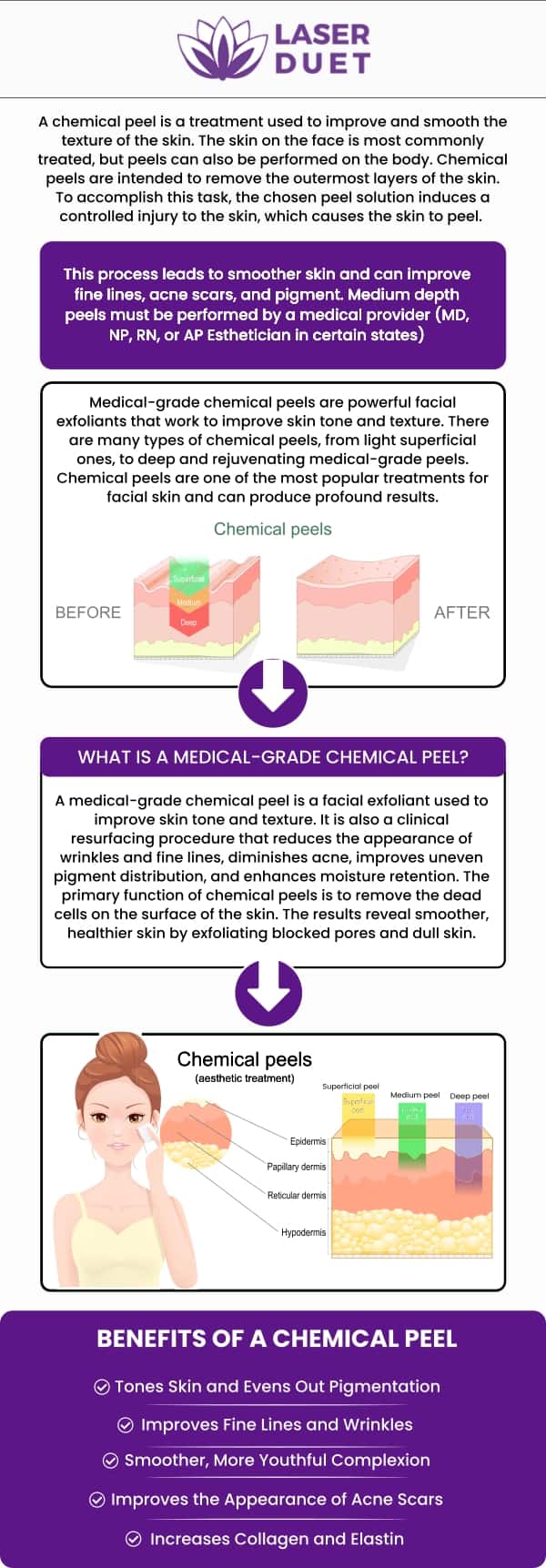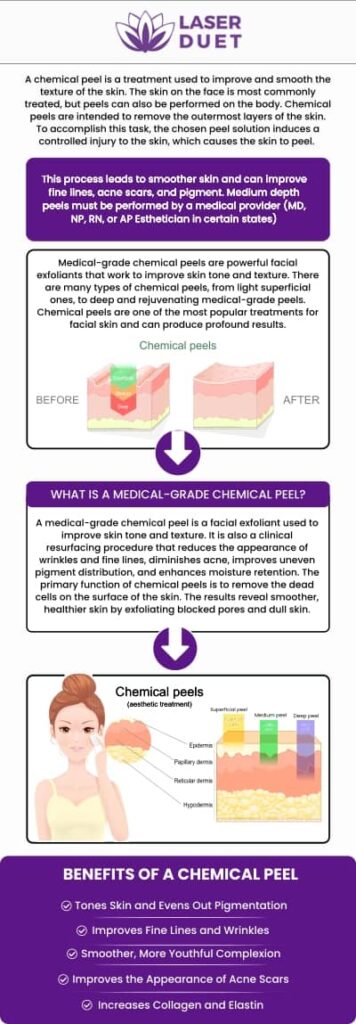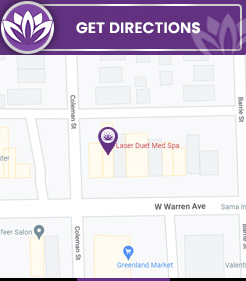Chemical Peels for Acne Scars Q&A
Chemical peels are superficial treatments that can be used to rejuvenate the skin, improve its tone, or help eliminate acne. Chemical peel facial treatment is available at Laser Duet Med Spa. For more information, contact us, or book an appointment online. We are conveniently located at 15238 W Warren Ave Ste #A, Dearborn, MI 48126.


Table of Contents:
How does acne scarring occur?
How does a chemical peel help reduce acne scars?
What should be expected during and after a chemical peel?
How often should you get a chemical peel?
Chemical peels are commonly used by people with dull, aging skin that could benefit from an increased cellular turnover as well as enhanced collagen production. Chemical peels are a favorite of both clients and dermatologists alike due to their proven track record and ability to rejuvenate even the harshest of skin conditions.
The skin is the largest organ in the human body and has three main layers; the outermost layer is the epidermis, the middle layer is known as the dermis, and the deepest layer is called the hypodermis. Also known as the integumentary system, these layers of the skin protect the body’s fragile insides from the elements, UV rays, and bacteria; they also help convert sunlight to vitamin D. Any area with sebaceous (relating to oil or fat) glands is prone to acne—the face, back, and chest are especially affected.
Inflammation from acne blemishes can lead to the development of acne scars. This occurs when the acne pore swells and the wall of the pore breaks down. Some acne blemishes are small and the scars created are shallow and heal quickly, but sometimes the contents of blemishes spill into the surrounding tissue and cause deeper scars. The skin responds by repairing the scar with the formation of new collagen fibers, a process known as neocollagenesis.
Acne scars take on two main forms: either a scar develops that is raised on the surface of the skin; or, a scar develops when there is a loss of tissue, resulting in an indentation in the surface of the skin. Raised or protruding acne scars are a sign that the skin is doing its job; the skin creates collagen to help heal the acne wound, but if it makes too much, raised scars form.
Acne scars can be stubborn and long-lasting; they can persist long after flare-ups have stopped. While time can heal these marks, several dermatologist-approved methods can speed up the healing process and shorten recovery from scars. One of the popular methods is the chemical peel, an intensive skincare treatment that comes in a variety of strengths. Chemical peels can:
• Smooth skin texture and tone
• Lighten dark spots and reduce hyperpigmentation
• Unclog pores to help prevent future breakouts
Chemical peels work by removing the top layer of skin, allowing new, healthy skin to take its place. Overall, chemical peels can be a great way to maintain and rejuvenate the skin as they are more effective at exfoliation than physical exfoliators (topical scrubs, for example). The trauma inflicted by the chemical not only kills and removes dead skin cells at the surface, but the intentional damage also stimulates the body’s natural response to produce collagen (neocollagenesis), which can help fill in scars.
Chemical peels are typically performed in a dermatologist’s office or medical spa; there is no anesthesia or mild local numbing. However, mild sedative medication may be used on the day of the procedure for patients who are receiving deeper chemical peels. Before the process starts, the skin is cleansed and dried thoroughly; thick emollients, gauze, or other methods are set in place to protect the client’s eyes, hair, nose, and mouth.
As the solution sits on the skin, there may be some stinging or discomfort present. The clinician may apply a neutralizing agent to the treatment area, depending on the type of chemical peel used. Mild to moderate peels are most often applied on the entire area at once, but deeper, more intensive chemical peels may be performed in small sections; this allows the dermatologist to carefully monitor the client’s response and adjust treatment, if necessary.
It is normal to experience some stinging or burning during a chemical peel, but clients should inform the practitioner if there is any excessive discomfort. After the treatment, mild side effects are common and should abate within a few days.
Chemical peels come in three main strengths: light, medium, and deep. Light peels, the most superficial of the three, and can be scheduled monthly. Medium peels, which provide more significant effects than light ones, can be scheduled every couple of months, but there should be a minimum of one month in between appointments to allow the skin to recover. Deep peels are the strongest chemical peels, and since they reach the deepest layers of the skin, should only be performed every few years.
Refresh Your Glow with Chemical Peels by Nisreen
At our clinic, Nisreen delivers expertly administered chemical peel treatments designed to rejuvenate skin by removing dull, damaged outer layers and revealing smoother, more radiant skin underneath. Using a tailored solution chosen for your individual texture and tone, she helps address concerns like uneven pigmentation, fine lines, and post‑acne marks. Backed by evidence showing chemical peels can treat wrinkles, discoloration, and roughness.
Take control of your acne scarring with the chemical peels offered at Laser Duet Med Spa! For more information, contact us, or book an appointment online. We are conveniently located at 15238 W Warren Ave Ste #A, Dearborn, MI 48126. We serve clients from Dearborn MI, Detroit MI, Warren MI, Sterling Heights MI, Ann Arbor MI, Livonia MI, and surrounding areas.
Check Out Our 5 Star Reviews








